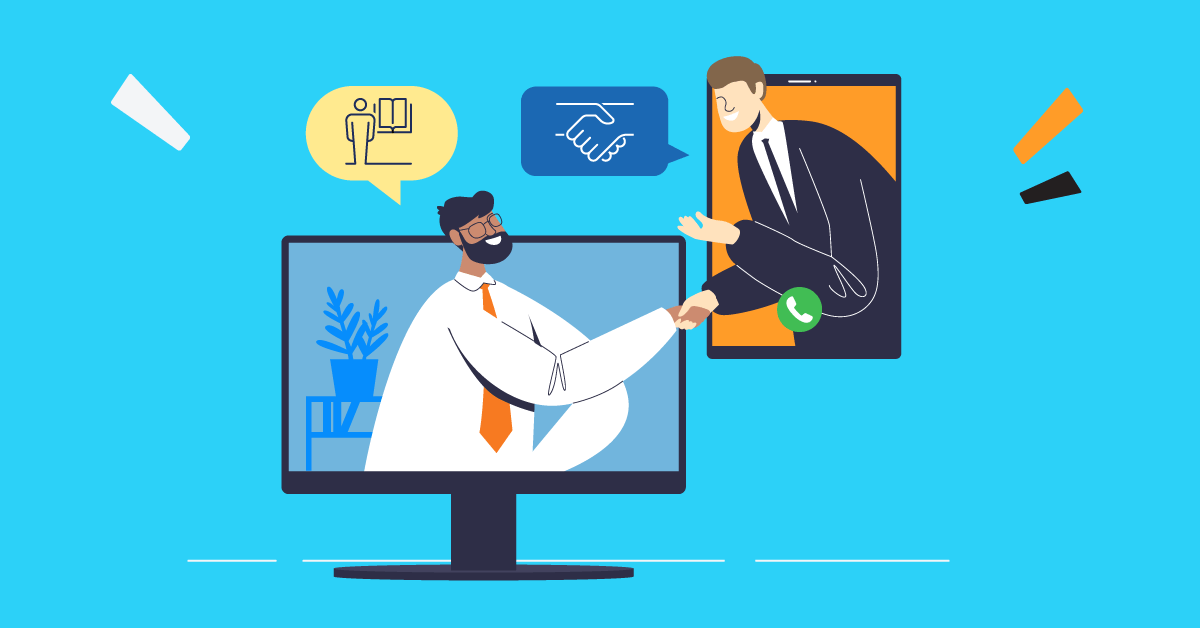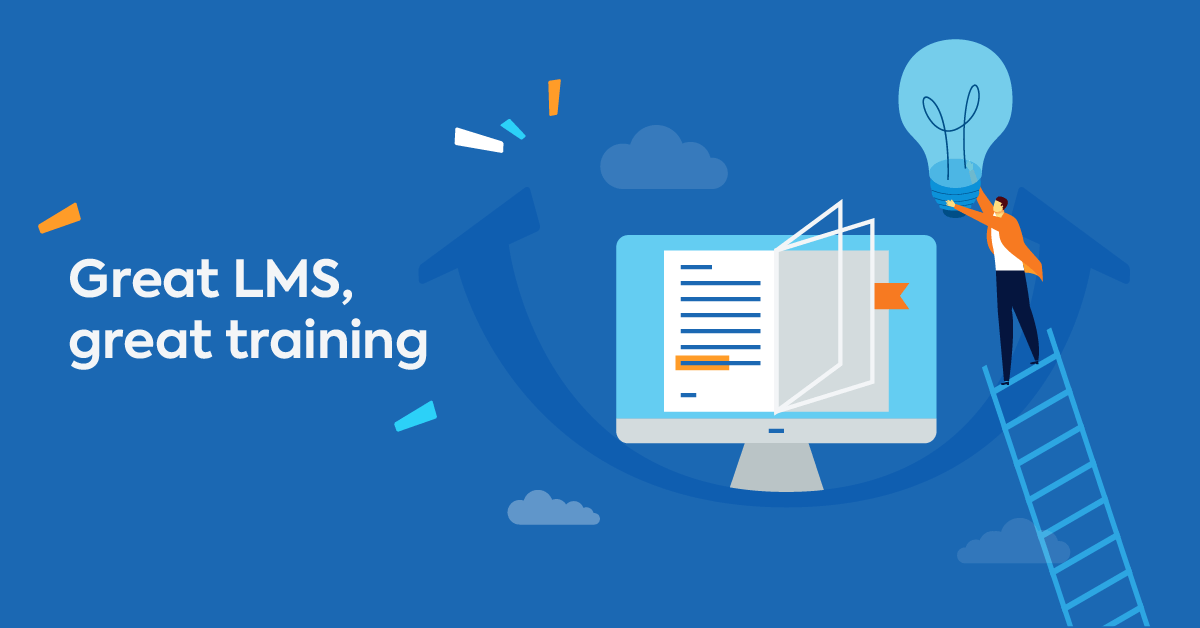- What is customer training?
- Benefits of customer training: A win-win for everyone
- Measuring customer training ROI: Unlocking long-term value
- 10 Tips on how to create a successful customer training program
- Which topics should customer training include?
- Why you should use an LMS for customer training
- Power up your business with customer training
All organizations want to keep their customers hooked. But how do you achieve that? The answer is clear. Start by empowering them. After all, customer training is more than just tutorials or guides. It’s a powerful way to boost loyalty, build trust, and drive growth.
When customers know how to use your product or service, they stick around. They become your biggest fans. And tell others about you.
In this article, we’ll explore all about training your customers, and show you how it can set your business apart from the competition. Think higher retention rates, better engagement, and stronger relationships.
Let’s dive in.
What is customer training?
Customer training (also referred to as customer education or customer enablement) is any training offered to customers so they can use an organization’s product or service to its full capacity.
Assist and support your customers to solve potential problems, before they encounter any, by offering the right customer training program on your customer training LMS. With customer training programs, you not only set up your customers for success but your business, too.
Customer training is not just an onboarding process.
While onboarding is a crucial part of the customer journey, it’s not just the first and final stop. To add extra value to your business, think of customer training as a process that extends through the entire life cycle of a customer.
A new customer will need different training than a customer who has been using your product or service for months or even years. Examples of a customer training program then include onboarding, guided tutorials, webinars, as well as ongoing training.
A project management software company, for example, would offer onboarding training to new customers. This type of training will show customers how to start using the product. The same software company can then offer ongoing customer training to keep customers updated on new features, plus the more advanced capabilities of the product, as well as use cases.
Benefits of customer training: A win-win for everyone
So, what are the advantages of customer training?
Customer education is more than just teaching your customers how to use your product or service. It’s about empowering them, improving their experience, and driving long-term success. For both the customer and your business.
Let’s explore why delivering customer training is one of the smartest moves you can make.
Benefits for customers
Faster onboarding
With effective training, customers can hit the ground running. They quickly understand your product’s value and feel confident using it, reducing frustration and hesitation. This accelerates their journey to achieving meaningful results, creating a positive first impression of your brand.
Improved product knowledge
When organizations deliver training sessions, they ensure customers know how to make the most of their product’s features. They discover solutions tailored to their needs and can explore advanced functionalities they might otherwise overlook. This comprehensive understanding maximizes their return on investment and boosts their confidence in choosing your product.
Enhanced confidence and independence
Well-trained customers don’t need to call support for every question. They gain self-sufficiency and feel empowered, creating a more seamless user experience. This independence leads to fewer frustrations, faster problem-solving, and a stronger sense of control over their success.
Increased success and satisfaction
When customers know how to achieve their desired outcomes with your product, they’re happier. They view your brand as a valuable partner, not just a vendor. Satisfied customers are more likely to recommend your product, becoming advocates who drive organic growth for your business.
Access to ongoing resources
Modern customer training often includes on-demand resources, such as tutorials, FAQs, and community forums. This gives customers the tools they need anytime, anywhere. Having a wealth of resources at their fingertips empowers customers to overcome challenges quickly and encourages continuous learning, keeping them engaged and loyal.
Improved decision-making
Well-trained customers can make better decisions about using your product to address their specific needs. They are more likely to adopt features or upgrades that align with their goals, ensuring their satisfaction over time.
How can effective customer training benefit a business?
Higher customer satisfaction
Your customers can seamlessly use your product and services to their fullest potential, in the way you want them to, once they complete a customer training program. Customers’ lives become easier in a way as your product/service brings value to them. And they’re happy and content.
Customer education will also help build confidence in the use of the product. This, in turn, will lead to customers discovering new ways to use your product that haven’t been considered by the creators, adding even more value.
Increased customer loyalty
Customer training programs are a great way of showing your customers that you want them to make the most out of your product/services. This gesture demonstrates high professionalism and respect towards the people that support your organization. As a result, your customers are more likely to stick with you and remain loyal.
Enhanced word-of-mouth advertising
Happy and loyal customers act as brand ambassadors who are willing to leave positive reviews online or spread the word about your product/services. It’s a cost-effective, reliable, and effortless way to advertise your business. Keep your customers satisfied by providing them with the necessary tools and information through effective customer training.
More opportunities for upselling
When your customers are satisfied from the overall experience of using one of your products or services, they are highly likely to trust your entire brand. As a result, they will potentially purchase more features, upgrades, or other products or services you offer, instead of a competitor’s.
Bigger revenue
Profit increases with the help of effective customer training. Satisfied and loyal customers bring more clients to your business, purchase more products and services, or features and renewals. At the same time, as your customer training answers their questions or helps with common problem-solving, you don’t need to invest in a big, costly customer support team.
Competitive advantage in the market
Modern businesses differentiate themselves by offering robust customer training programs through a customer training LMS. When customers are provided with customer training opportunities, tailored to their individual needs, they create a positive perception of your company. This greatly impacts your brand reputation.
Measuring customer training ROI: Unlocking long-term value
Customer training isn’t just a tool for better customer experiences—it’s a measurable investment that drives tangible business results.
By reducing costs, increasing revenue, and boosting loyalty, customer training delivers undeniable financial value. Let’s see the key metrics you should focus on:
Customer retention rates
Retaining customers is far cheaper than acquiring new ones. Training helps reduce churn and builds long-term loyalty by empowering customers to succeed with your product.
Example: According to Salesgenie, 5% boost in customer retention rates can increase profitability by as much as 95%, delivering a significant impact on your bottom line.
Support ticket volume and resolution times
Well-trained customers solve common issues on their own, leading to fewer tickets and faster resolutions. This not only saves costs but also frees up your support team for more complex tasks.
Example: Companies have reported a 15% decrease in support tickets after launching comprehensive training programs.
Upsell and cross-sell revenue
Training encourages customers to explore advanced features and add-ons, increasing their confidence and willingness to invest more. Knowledgeable customers are more likely to upgrade or expand their use of your offerings.
Example: Trained customers generate 20–30% more upsell revenue compared to untrained users, according to Salesgenie.
Customer Satisfaction Scores (CSAT)
Training programs directly impact satisfaction by ensuring customers can fully leverage your product’s value. High CSAT scores are a strong signal that your program is creating positive experiences and building trust.
Example: Nosto, an eCommerce personalization platform, leveraged TalentLMS to train their employees efficiently. This strategic training initiative led to exceptional revenue growth and more satisfied customers as their team became more adept at meeting client needs.
Net Promoter Score (NPS)
Trained customers are more likely to become advocates for your product, sharing positive feedback and driving referrals. Advocacy cuts Customer Acquisition Costs (CAC), delivering long-term growth.
Example: Word-of-mouth advocacy can reduce CAC by even a half, making scaling more efficient.
Scalable growth
Modern LMS platforms make it easy to deliver training to thousands of customers at minimal additional cost. This scalability ensures your program continues driving value without draining resources.
Example: Scaling training for hundreds of user costs far less than individual customer onboarding sessions.
10 Tips on how to create a successful customer training program
You now have a clear understanding of the benefits of customer training and how to measure customer training ROI.
But how do you start building a strategy that truly delivers results? Here are 10 best practices to guide you:
1. Identify and understand customer needs
Your products and services cater to diverse needs. For instance, a time-tracking tool might help businesses manage billing and project costs, while aiding individuals in tracking hobbies or personal goals. Tailor your training to specific audiences by conducting surveys or user interviews to ensure relevance.
2. Create clear, engaging, and flexible content
Develop training materials that cater to various learning styles, such as videos, presentations, and microlearning modules. A training course can have interactive elements like quizzes, gamification, and discussion forums to keep learners engaged. For quick content creation, tools like TalentCraft, your AI course content generator, can help create complete units in no time.

3. Personalize the learning experience
Not every customer learns the same way or at the same pace. Personalize training with customizable learning paths, self-assessments, and mobile learning options. Utilize features like automated notifications to keep learners on track with reminders for milestones, feedback, or new materials.
4. Promote collaboration and community engagement
Active learning thrives in collaborative environments. Use discussion boards for peer interaction, integrate webinars, and host live Q&A sessions. Such features not only help customers learn, but also create a sense of community around your product or service.
5. Leverage data-driven insights
Monitor the performance of your training course using analytics. Track metrics like course completion rates, skill improvements, and scores of satisfied customers. Use these insights to refine your approach, ensuring content evolves with customer needs.
6. Ensure accessibility for all
Make your training programs universally accessible by adopting mobile-friendly platforms and inclusive features like closed captions, text-to-speech tools, and easy navigation for users of varying skill levels.
7. Keep content fresh and relevant
Regularly update your customer training materials to reflect new product features, emerging industry trends, or customer feedback.
8. Use feedback to improve
Collect feedback through surveys, polls, or direct conversations to gauge the effectiveness of your training. Act on this feedback by addressing areas of improvement and celebrating successes.
9. Celebrate customer achievements
Recognize customer milestones by awarding badges, certificates, or public acknowledgment. Certifications can enhance professional credibility and demonstrate your commitment to customer growth.
10. Offer continuous support and resources
Provide ongoing resources like user guides, webinars, and a support portal to help customers maximize the value of their training even after course completion.

Which topics should customer training include?
For your client training to be effective, and well-rounded, it’s important that you offer all the relevant training topics your customers need. Let’s take a look at the hottest topics you should deliver through your customer training LMS:
Product knowledge training
Give customers a better understanding of your product or services with product knowledge training. Offer training material on your customer training LMS that covers the following categories related to your products: product introduction, key features, solutions, use cases, and core benefits.
Customer onboarding training
During onboarding and implementation training, customers learn how to set up and use your product or service. This journey includes everything—sign up steps, activation, first use—in great detail. Even in their first use, customers receive great value, as they feel confident in a completely guided environment.
Customer support and troubleshooting
It’s impossible that your customers won’t have questions and queries while using your product or services. Conduct surveys through your customer training LMS to find out the common pain points customers might have. Then, collect FAQs and other issues your customers may have in collaboration with your customer support team.
Industry-specific training
Providing customer training with a generic approach might not be sufficient for your customer needs. Every industry has its own standards, best practices, and trends. Create an extra level of relevance between your product/services and the industry of your customers’ interest. Train them on how to best implement technologies and methodologies in their industry using your products and services.
Why you should use an LMS for customer training
A Learning Management System (LMS) is a powerful tool for creating a better customer training strategy. It makes learning simple, engaging, and effective.
Here’s why using an LMS can transform your training:
Intuitive design for seamless learning
Customers need a platform that doesn’t get in the way of their learning. An intuitive, user-friendly LMS like TalentLMS ensures a smooth experience from login to course completion. Its modern interface and responsive design minimize technical hurdles, keeping customers focused on learning rather than navigating the system. This ease of use is especially critical for non-technical users, ensuring accessibility across all customer segments.
Supports seamless onboarding
Onboarding is a crucial step in the customer journey. Customer training software helps guide new customers through account setup, activation, and first use. Interactive modules, videos, and step-by-step guides make the process clear and stress-free. A great onboarding experience builds confidence and ensures customers start strong with your product.
Customizable and versatile content delivery
An LMS empowers you to deliver content in formats that suit different learning preferences. For example, videos, infographics, quizzes, or text. Some customers might prefer quick video demonstrations when troubleshooting an issue. On the other hand, those exploring in-depth features may benefit from downloadable manuals or scenario-based exercises. This versatility supports personalization and ensures training aligns with diverse needs.
Enhanced engagement with dynamic features
Gone are the days of dull, one-size-fits-all training. With an LMS, you can create interactive and engaging experiences using gamification, scenario-based learning, and microlearning. For example, you can implement leaderboards, reward systems, or even simulated environments where customers can practice using your product in real-world scenarios. These features boost knowledge retention and keep learners coming back for more.
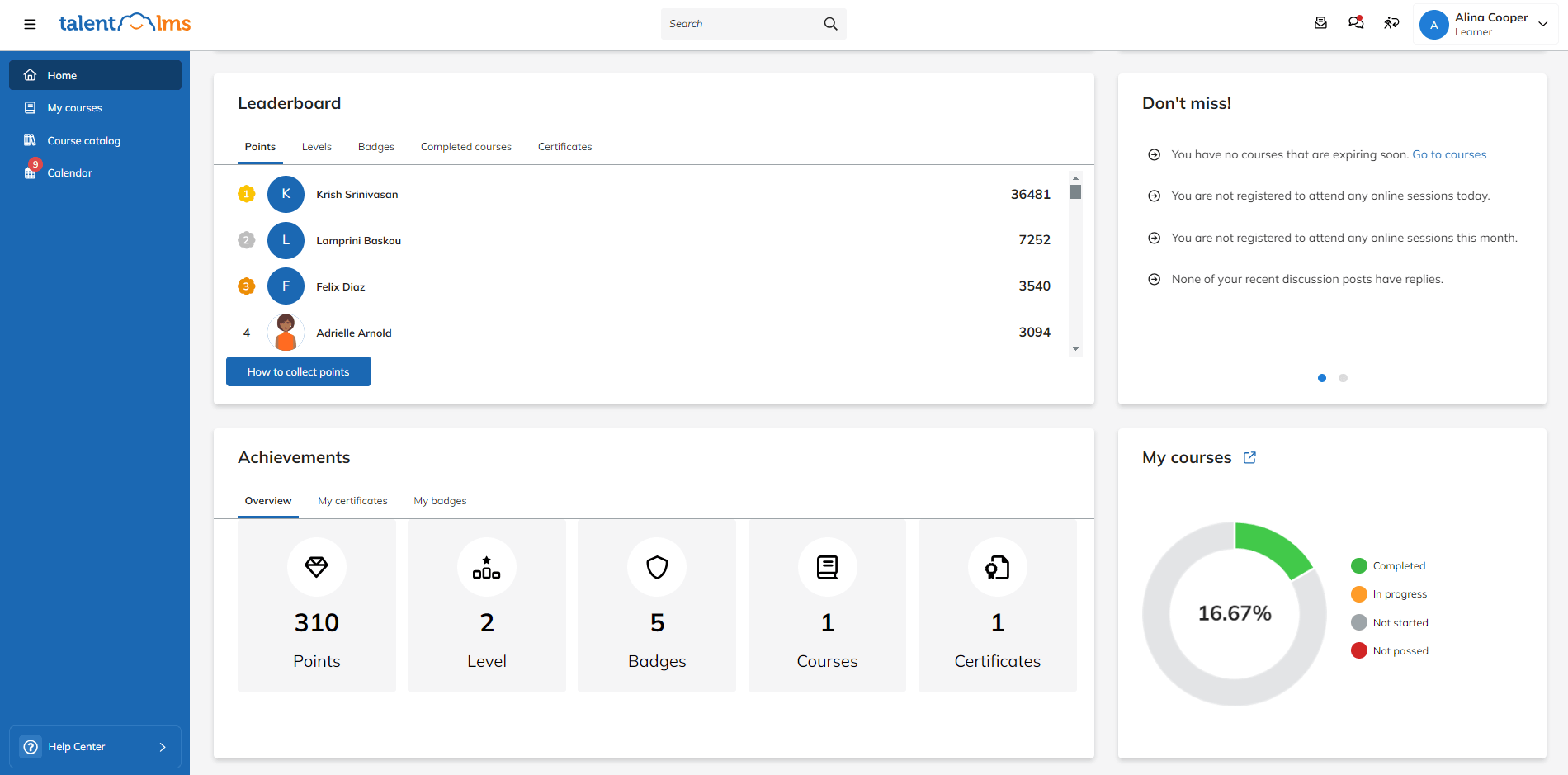
Anytime, anywhere learning
With mobile compatibility, your LMS provides flexibility for customers to learn at their convenience. Whether they’re at their desk, commuting, or on-site using your product. This “on-the-go” accessibility is especially valuable for global customers in different time zones. Or industries requiring just-in-time learning, such as field services or healthcare.
Scalable training for growing businesses
As your customer base expands, manually managing training can become overwhelming. An LMS streamlines scalability by automating processes like course assignments, reminders, and updates. Whether you’re training 10 or 10,000 customers, your LMS ensures consistency in delivery and quality, saving both time and resources.
Data insights for continuous improvement
Data is at the heart of effective training programs. TalentLMS provides detailed reports and dashboards to track learner participation, course completion rates, and skill gaps. These insights enable you to identify trends, optimize content, and measure the impact of your training programs on customer satisfaction and business goals. Plus, with reporting tools, you can measure the training ROI to demonstrate their value to stakeholders.
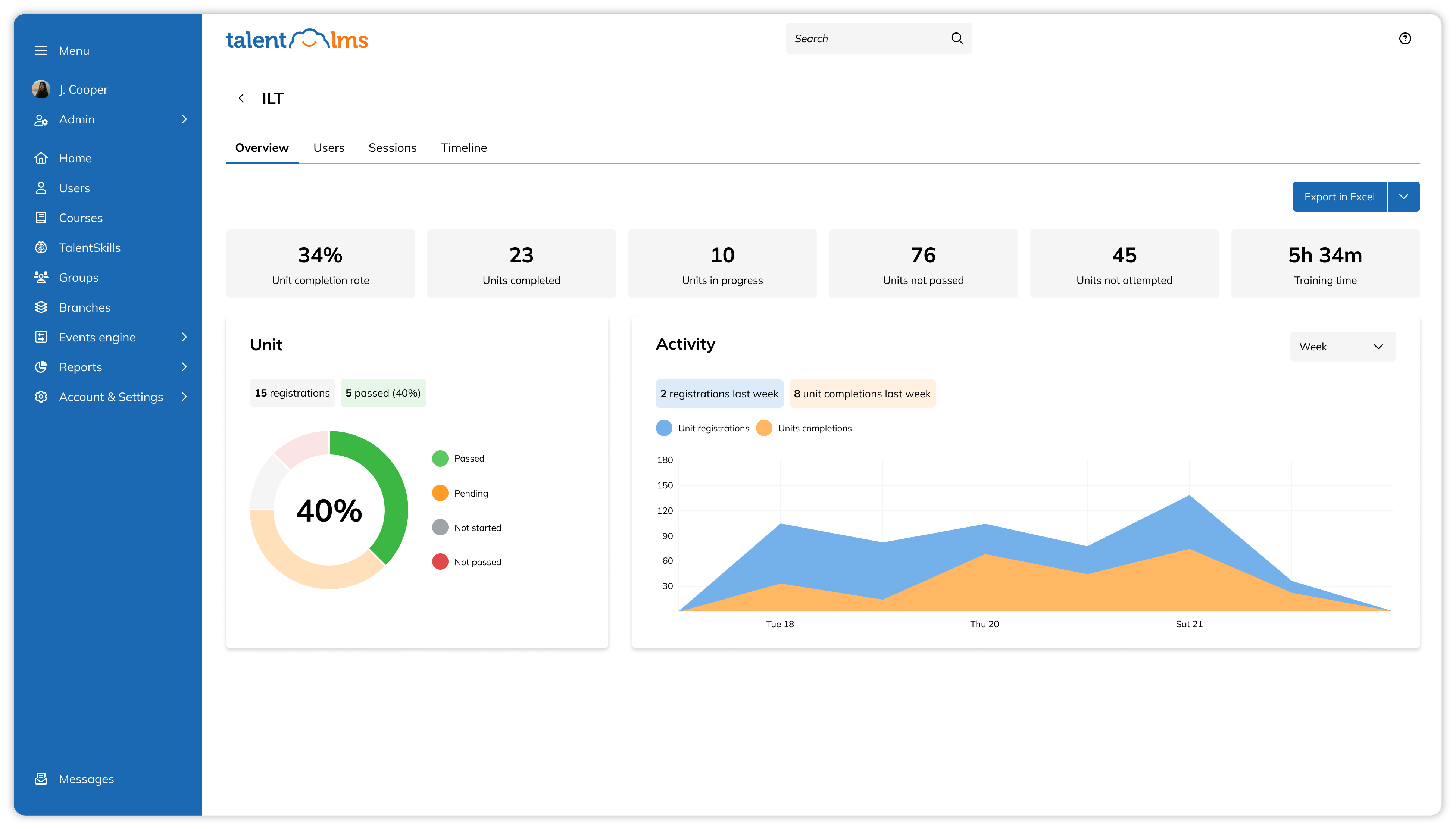
Cost-efficiency and ROI
Traditional training methods, such as in-person workshops, can be costly and resource-intensive. But an LMS offers a cost-effective alternative. It helps eliminate expenses like travel, venue rentals, and printed materials. So, you can reallocate resources to develop richer, more impactful content.
Support for monetization
An LMS doesn’t just train customers—it can also generate revenue. Does your training material have value beyond your existing customer base? Then, you can monetize them by offering them as paid courses. Integrated eCommerce features in TalentLMS allows you to manage transactions. This gives your online training programs an extra dimension of profitability.
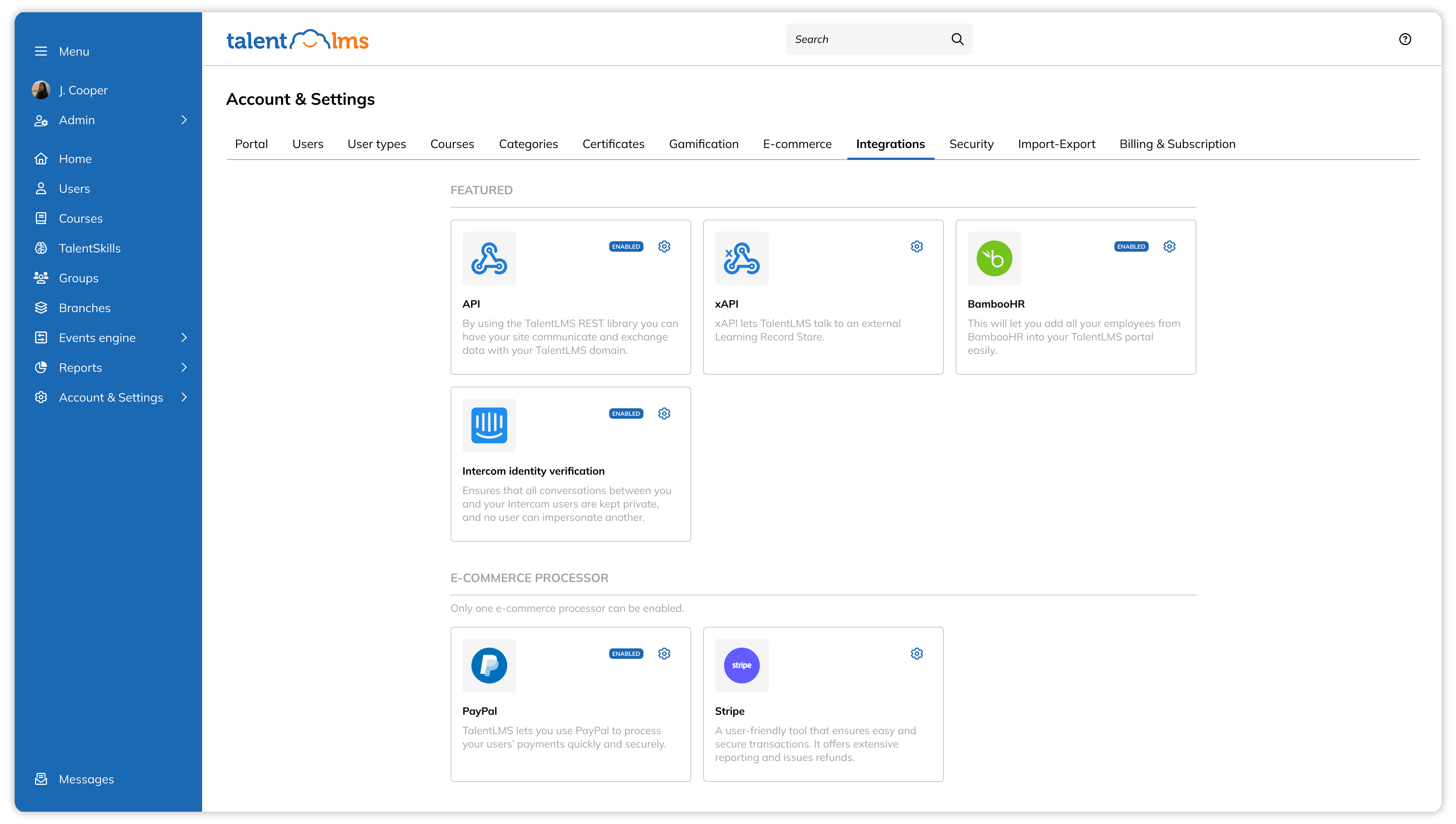
Faster adaptation to change
Today, agility is key. An LMS enables you to quickly update or roll out new training content in response to product updates, customer feedback, or market trends. If a new feature is released, you can immediately launch the respective training module to ensure customers are equipped to use it effectively.
Improved customer loyalty and advocacy
A well-designed LMS fosters long-term relationships by demonstrating your commitment to customer success. Customers that see that you’ve invested in their learning and growth, are more likely to remain loyal. Plus, recommend your brand to others. When customers earn certifications on your LMS, they can share them on their social media. This amplifies your brand’s visibility and reputation.
Power up your business with customer training
Customer training is all about creating advocates, fostering brand loyalty, and unlocking measurable growth. When organizations invest in their customers’ success, they’re investing in their own.
With tools like an LMS, you streamline learning, track results, and adapt quickly to changing needs. After all, businesses that prioritize customer training see real results like reduced customer churn, they increase customer satisfaction, and have more upsell revenue.
Customers expect more than your product. They want a partner along their journey. Become that partner, and the rewards will follow. Now is the time to lead the way.
| Tags: Corporate Training,customer training,training and development
